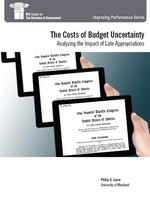
The Costs of Budget Uncertainty: Analyzing the Impact of Late Appropriations

This report comes at an especially opportune time, calling attention to the increasingly unpredictable federal budget process and the many challenges it creates for efficient and effective management of federal operations. But even in this environment, federal managers must still deliver services and programs as effectively and efficiently as possible. What steps can they take to do so?
By analyzing historical events and interviews with participants, Dr. Joyce describes the effects of late appropriations on federal operations over the last 35 years, and explains how federal managers have attempted to address increasingly greater levels of budget uncertainty. He also describes in compelling detail the effects—and costs—on government operations of the recent congressional practice of relying on continuing resolutions (CRs) to temporarily fund government for increasingly longer amounts of time.
This report is a very helpful guide for federal managers; state, local, and non-profit grant recipients; and federal contractors to understand the background behind continuing resolutions and how they operate, as well as the different impacts of CRs and government shutdowns.
Joyce points out that the current approach to continuing resolutions actually drives up the cost of government and reduces its effectiveness and efficiency.He offers several recommendations to the Congress, the President, and agencies on ways to ameliorate the adverse effects of continuing resolutions on agency operations.
Watch his testimoney in front of the Senate Committee on Homeland Security and Governmental Affairs.
Read the article in Bloomberg by Max Stier, Chief Executive Officer at Partnership for Public Service
Read the WashingtonPost article.
Listen to his interview on Federal News Radio.
Read the article by Linda Bilmes, the Daniel Patrick Moynihan senior lecturer in public policy at Harvard University.



